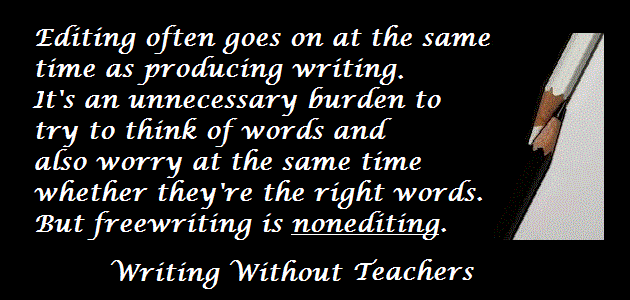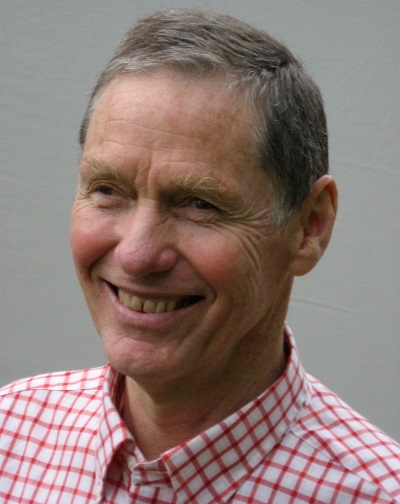Bio
Peter Elbow is Emeritus Professor of English at the University of Massachusettes Amherst and author of numerous books and articles about writing. He writes in numerous ways about how everyday spoken language can make writing more feasible, lively, and clear--even formal writing. His larger theme is the democratization of writing (his first collection of essays being titled Everyone Can Write, 1985).
He is perhaps best known as the author of Writing Without Teachers (1973) and Writing with Power: Techniques for Mastering the Writing Process (1981), books intended primarily for lay readers, but which transformed the way writing was taught from grade schools through the University. He didn't invent freewriting as a writing technique (Ken Macrorie deserves credit for that), but he developed and expanded the uses of freewriting and got the word out widely to teachers and writers alike. Teachers and theorists also appreciated his other techniques such as how to use peer response groups; and how to use the believing game to help readers better understand and empathize with the author of a text instead of leaping immediately to criticizing the text. His first two books, Writing Without Teachers and Writing With Power have sold more than 160,000 copies--not as textbooks but as help for individuals and writing groups. In these books he established his larger theme: the democratization of writing. His most recent book, Vernacular Eloquence: What Speech Can Bring to Writing (2012), explores ways we can use everyday spoken language even while learning to produce formal written language--again toward the goal of making writing less daunting and more powerful.
Elbow has written or co-authored six other books particularly for writers and teachers of writing. With Pat Belanoff and Sheryl Fontaine, he wrote Nothing Begins with N: New Explorations of Freewriting (1990), which inspired many to continue use of this powerful technique. With Pat Belanoff, he wrote a textbook for use in writing courses: A Community of Writers: A Workshop Course in Writing (1989, 1999). In this work, Elbow specifically advocated cooperation among peers and unconditional listening. As part of this book--but also published separately as a pamphlet--they wrote Sharing and Responding (1989, 1994, 1999) to give writers more specific help when they meet together to give mutual feedback. They substantially revised A Community of Writers in 2003, calling this work Being a Writer. Three collections of essays round out his work: Landmark Essays on Voice and Writing (1994), which puts voice back into the center of theory and practice; Everyone Can Write (2000) which reaffirmed the near universal desire and ability for writing; Writing about Media (2008) is Elbow's course on critical media studies for the writing classroom. This course uses video and images and is published by Media Education Foundation (MEF), a group dedicated to helping adolescents avoid being deceived by propaganda, advertising, and other manipulative media messages.
Aside from writing, another large theme in Elbow's work is the expansion of his ideas into higher education writ large, comprising four separate books. He wrote Embracing Contraries (1986), a book that moved past binaries and privileged teaching for understanding. Reporting on the conclusions of a large conference about the continuing identity of English departments, Elbow wrote What is English? (1990), arguing that English courses still provided among the best general education opportunities. For researchers across the humanities, Elbow edited a special issue of Pre/Text (1990) which was devoted to personal and expressive writing that does the work of academic discourse, an important theme in a sometimes impersonal academy. Another multi-disciplinary work of his was Writing to Learn (1997), a guide Elbow co-edited with Sorcinelli that encourages professors from all disciplines to enact strategies for assigning and responding to writing across the curriculum in order to help them incorporate writing fully into their teaching.
Elbow has been the Director of Writing Programs for over ten years, first at Stony Brook and then at UMass Amherst. He was on the founding faculty at two experimental colleges, Franconia College in New Hampshire and Evergreen State College in Washington State--precursors to today's movements towards interdisciplinary teaching.
One of the main themes in Elbow's writing over the years has been assessment. He's explored this topic extensively because of his continuing critique of conventional grading--in particular of how it tends to undermine the teacher-student relationship. He has written more than twenty articles suggesting ways to mitigate this problem. He also wrote pioneering work on the use of portfolios and contracts for grading.
In 1985, Elbow was awarded the Braddock Award for the best essay in College Composition and Communication, the aptly-named "The Shifting Relationships between Speech and Writing." In 1993, he received the James A. Berlin award for the best essay of the year in Rhetoric Review for his landmark piece "The War between Reading and Writing--and How to End It." Later, in 2001 NCTE gave him the James R Squire Award "for his transforming influence and lasting intellectual contribution to the English Profession." Finally in 2007 and in recognition of his vast contributions to the field of rhetoric and composition, comprising over 100 scholarly articles and a dozen books, the Conference on College Composition and Communication presented him with the Exemplar Award for "representing the highest ideals of scholarship, teaching, and service to the entire profession."
Peter Elbow is Emeritus Professor of English at the University of Massachusettes Amherst and author of numerous books and articles about writing. He writes in numerous ways about how everyday spoken language can make writing more feasible, lively, and clear--even formal writing. His larger theme is the democratization of writing (his first collection of essays being titled Everyone Can Write, 1985).



